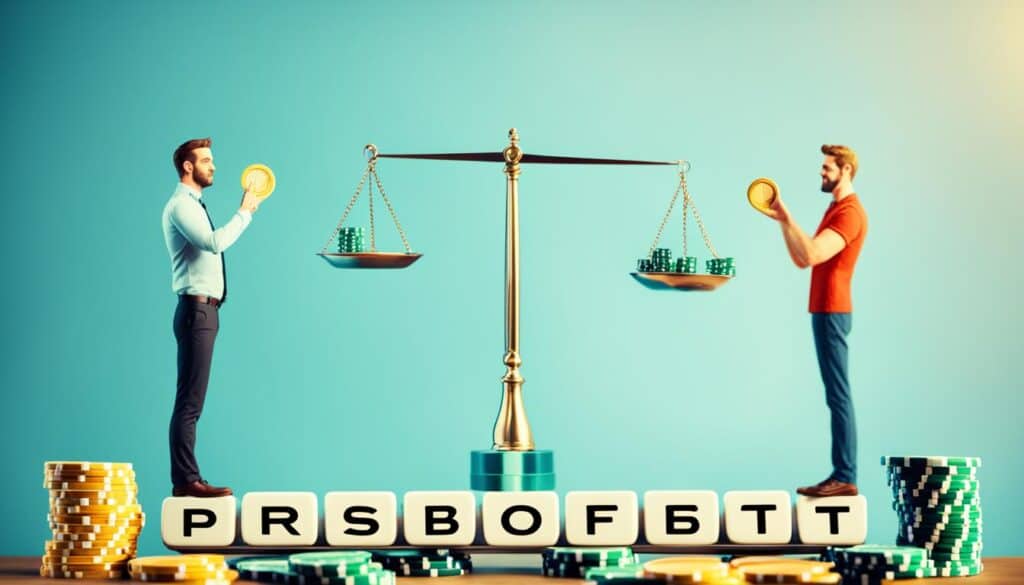Gambling has been a popular activity throughout history, encompassing various forms such as sports betting, casino games, and online gambling. However, concerns have arisen regarding the social and economic impacts of gambling, prompting an examination of its ethical implications. This article delves into the delicate balance between profitability and responsibility in ethical gambling.
Key Takeaways:
- Ethical gambling involves balancing profit with social responsibility and fair play standards.
- Personal freedom and social responsibility are two factors in the ethical debate surrounding gambling.
- Responsible gambling practices aim to minimize negative impacts such as addiction and financial ruin.
- Aligning profit and responsibility can lead to positive brand reputation and customer loyalty.
- Building an ethical and sustainable future in the gambling industry requires dedication and collaboration.
The Importance of Personal Freedom in Gambling

Personal freedom is a fundamental human right that holds great significance in many countries, including the United States. When it comes to gambling, proponents argue that individuals should have the freedom to engage in this activity as a form of entertainment and personal choice.
Gambling offers a unique source of entertainment for individuals seeking thrill and excitement. It provides an avenue for people to engage with various games and activities that cater to their interests and preferences. Whether it be sports betting, casino games, or online gambling, the entertainment value of gambling is undeniable.
In addition to entertainment, there are significant economic benefits associated with the gambling industry. The industry creates job opportunities and stimulates economic growth. From casino employees to online platform developers, the gambling sector contributes to job creation and revenue generation.
However, there are critics who argue that personal freedom should have limits, particularly when it comes to gambling. They emphasize the potential negative consequences that can arise from excessive gambling and the need for government intervention to protect individuals from harm.
Personal freedom is an essential aspect of an individual’s rights, but it is important to strike a balance between personal freedom and societal well-being. Government restrictions and regulations aim to mitigate the potential negative impacts of gambling and ensure the protection of vulnerable populations.
Ultimately, the importance of personal freedom in gambling lies in the recognition of individuals’ rights to engage in an activity they find enjoyable. At the same time, it is crucial to acknowledge and address the potential risks and negative consequences that may arise from irresponsible or excessive gambling.
By promoting responsible gambling practices, fostering transparency, and creating a safe gambling environment, the industry can uphold personal freedom while prioritizing the well-being of individuals and society as a whole. It is through this delicate balance that the ethical dimensions of gambling can be effectively addressed.
The Role of Social Responsibility in Gambling

Social responsibility plays a crucial role in the gambling industry, as it focuses on the ethical obligation to promote the well-being of society. In the context of gambling, this means addressing and minimizing the negative impacts associated with it. One of the key negative consequences of gambling is addiction, which can have profound effects on individuals and their families.
Gambling addiction is a serious problem that can lead to financial ruin, strained relationships, and overall deterioration of a person’s well-being. It is essential for gambling operators to recognize this issue and take responsible measures to prevent and address addiction within their establishments. By implementing programs and resources that promote responsible gambling, operators can provide support and help for those who may be struggling with addiction.
By prioritizing social responsibility, the gambling industry can protect vulnerable populations, such as individuals with pre-existing gambling problems or those who are more susceptible to developing gambling addictions.
Financial ruin is another negative impact associated with gambling. When individuals engage in excessive gambling and risk their financial stability, it can lead to dire consequences and negatively affect not only the individuals themselves but also their families and communities. Responsible gambling practices advocate for financial education and risk management, ensuring that individuals are aware of the potential risks involved and can make informed decisions regarding their gambling activities.
Vulnerable populations, such as minors and individuals with mental health issues, are also at increased risk in the gambling industry. It is crucial for operators to implement strict measures to prevent the targeting and exploitation of vulnerable individuals. By adhering to responsible gambling practices, operators can create a safe and fair gambling environment that protects vulnerable populations from harm.
Responsible gambling practices aim to promote transparency, fairness, and safety within the industry. By establishing clear guidelines and regulations, gambling operators can ensure that their practices are conducted ethically and in accordance with social responsibility standards. This not only protects individuals but also helps to maintain the integrity and reputation of the gambling industry as a whole.
The Tension Between Personal Freedom and Social Responsibility

When it comes to gambling, there exists a delicate balance between personal freedom and social responsibility. On one hand, individuals have the right to make their own choices and pursue activities that bring them joy and excitement. Gambling, for many, is a form of entertainment and personal freedom that should be respected.
However, personal freedom comes with a responsibility to consider the implications and potential harm that gambling can bring. The negative consequences of gambling, such as addiction and financial ruin, can have a profound impact not only on the individuals involved but also on the broader society.
The tension lies in finding a middle ground that respects personal freedom while also minimizing the negative societal impacts of gambling. This involves implementing policies and regulations that promote responsible gambling practices, prevention of problem gambling, and harm reduction.
Responsible gambling practices prioritize transparency, fairness, and safety in the industry. They aim to protect vulnerable populations and ensure that individuals can engage in gambling activities without compromising their overall well-being. Striking a balance between personal freedom and social responsibility is essential for creating a sustainable and ethical gambling environment.
“The tension between personal freedom and social responsibility in gambling stems from the need to safeguard individuals and communities while respecting personal choice.”
– Expert in responsible gambling
Responsible Gambling Initiatives

Responsible gambling initiatives are essential in establishing trust and loyalty among customers. Operators that prioritize player safety and adhere to legal and ethical requirements demonstrate social responsibility. By implementing responsible gambling practices, businesses not only fulfill their legal obligations but also create a safer and more trustworthy gambling environment.
Contrary to common misconceptions, responsible gambling practices do not hinder profitability; in fact, they can enhance it. By building a positive brand reputation through ethical conduct, operators can differentiate themselves from competitors and attract socially conscious customers who prioritize player well-being.
Responsible gambling initiatives encompass various measures, such as promoting player education, setting limits on spending, implementing self-exclusion programs, and offering support for those at risk of developing gambling-related problems. These initiatives aim to minimize the negative consequences of gambling and ensure that players can enjoy their gambling experience responsibly.
One of the key benefits of responsible gambling initiatives is the establishment of trust between operators and customers. When players feel that their well-being is a priority, they are more likely to trust the operator and continue their engagement with the gambling platform.
“Responsible gambling initiatives create a win-win situation for both operators and customers. By prioritizing player safety, operators can build trust, attract loyal customers, and ultimately foster a sustainable and successful gambling business.”
Building a Positive Brand Reputation
Responsible gambling initiatives play a crucial role in building a positive brand reputation. Customers appreciate operators who demonstrate a commitment to player well-being and responsible business practices. By proactively addressing the potential risks associated with gambling, operators can position themselves as responsible industry leaders.
A strong brand reputation not only attracts new customers but also promotes customer loyalty. When players perceive an operator as trustworthy and responsible, they are more likely to continue gambling with that operator over the long term.
Attracting Socially Conscious Customers
Responsible gambling initiatives also attract socially conscious customers who prioritize ethical behavior and social responsibility. These customers actively seek out gambling operators with responsible practices and may choose to spend their money exclusively with those operators.
By aligning with the values of socially conscious customers, operators can tap into a niche market and gain a competitive advantage over other operators who do not prioritize responsible gambling.
An Image Promoting Responsible Gambling
The image above depicts a responsible gambling message, showcasing the importance of safe and responsible play. This image serves as a visual reminder of the commitment to responsible gambling initiatives.
Overall, responsible gambling initiatives are vital for maintaining trust, fostering customer loyalty, and meeting legal and ethical requirements. By embracing responsible gambling practices, operators demonstrate their commitment to player well-being and contribute to the industry’s long-term success.
The Ethical Imperative in Gambling

Ethical imperatives serve as a guiding principle for businesses in the gambling industry. These imperatives encompass a range of values and practices that promote responsible and ethical behavior. By following these ethical guidelines, businesses not only fulfill regulatory obligations but also contribute to consumer protection, transparency, fairness, responsible marketing, privacy, and long-term customer loyalty.
Ensuring consumer protection is a fundamental ethical imperative in the gambling industry. Operators must prioritize the safety and well-being of their customers by implementing robust security measures and providing fair and transparent games. By doing so, they create an environment where players feel confident and protected.
Transparency is another crucial aspect of ethical gambling. Operators should be open and honest about the odds, rules, and potential risks associated with gambling activities. This allows players to make informed decisions and mitigates the potential for deception or manipulation.
“Transparency and fairness are not only ethical imperatives but also key elements in building trust between operators and players.”
Responsible marketing practices are essential for ethically conducting business in the gambling industry. Operators must avoid targeting vulnerable populations, including minors and individuals with gambling addictions, and must ensure that their advertising is truthful and responsible. By promoting responsible gambling behaviors, operators can minimize the potential harms associated with excessive gambling.
Ethical data collection and use are important considerations in the gambling industry. Operators must handle customer data with the utmost care and respect privacy rights. Safeguarding personal information and ensuring compliance with data protection regulations are essential for maintaining trust and integrity.
Community engagement is an ethical imperative that extends beyond the gambling industry. Operators should actively contribute to the well-being of the communities in which they operate, supporting local initiatives and programs that promote responsible gambling and mitigate the potential negative impacts of gambling.
By aligning their operations with these ethical imperatives, businesses in the gambling industry can build a positive brand image, foster long-term customer loyalty, and contribute to a safer and more responsible gambling environment.
Challenges in Balancing Profit and Responsible Gambling

As businesses in the gambling industry strive to maximize profit, they often encounter challenges in maintaining responsible gambling practices. The pursuit of revenue can sometimes lead to conflicts with the well-being of players and responsible gambling initiatives. Attracting new customers may unintentionally compromise efforts to prevent gambling-related harm. These challenges highlight the delicate balance that businesses must strike between short-term gains and long-term sustainability.
When profit becomes the primary focus, responsible gambling practices may take a backseat. This can lead to a prioritization of revenue-maximizing strategies at the expense of player well-being. The potential conflicts arise when businesses are tempted to employ aggressive marketing tactics or make it easier for individuals to engage in excessive gambling. In such cases, the short-term gains may come at the cost of long-term harm prevention and responsible gambling practices.
Additionally, attracting new customers in a highly competitive industry can pose challenges for businesses committed to responsible gambling. The use of enticing promotions or incentives may attract individuals who are at risk of developing a gambling problem. Balancing the need for customer acquisition with responsible gambling practices becomes a delicate tightrope walk for operators.
Businesses must also consider the long-term sustainability of the industry. While short-term gains may seem appealing, compromising responsible gambling practices can tarnish a company’s reputation in the long run. Maintaining a positive public image and fostering trust among customers and regulators are crucial for the industry’s overall sustainability.
Striking the right balance between profit and responsible gambling practices requires careful consideration and a commitment to ethical decision-making. By implementing responsible gambling policies, promoting player well-being, and addressing potential conflicts, businesses can work towards achieving a sustainable and socially responsible gambling industry.
Opportunities for Alignment in the Gambling Industry

Despite the challenges, the gambling industry presents significant opportunities for alignment between profit and responsible gambling practices. By prioritizing ethical and responsible gambling, businesses can not only safeguard their brand reputation but also enhance customer retention and differentiate themselves in the market.
Building a positive brand reputation is key to attracting and retaining customers who value ethical operators. When businesses demonstrate a commitment to responsible gambling practices, they establish trust with players and create a sense of loyalty. Consumers are more likely to choose operators that prioritize player well-being and operate ethically.
Moreover, ethical operators have an opportunity to differentiate themselves in a competitive market. By setting themselves apart through responsible gambling initiatives, such as implementing player protection measures and promoting transparency, businesses can attract socially conscious customers who seek a safer and more responsible gambling experience.
In addition to brand reputation and differentiation, responsible gambling practices also position businesses to comply with evolving regulatory requirements. By proactively adopting and implementing responsible gambling standards, operators can avoid potential fines and legal challenges, ensuring regulatory compliance and a smoother operating environment.
Overall, aligning profit and responsible gambling practices offers a multitude of benefits for the gambling industry. By focusing on brand reputation, customer retention, differentiation, and regulatory compliance, businesses can create a sustainable and responsible gambling environment that prioritizes the well-being of players and the broader community.
The Rise of Responsible Gambling

Responsible gambling is a critical aspect of ensuring the well-being of individuals who engage in gambling activities. It goes beyond mere entertainment and focuses on creating a safe and responsible environment where players can make informed decisions. Implementing measures to prevent and address problem gambling is at the forefront of responsible gambling practices. By promoting safe play and fostering transparency, responsible gambling aims to safeguard the physical and mental well-being of individuals.
Responsible gambling acknowledges the importance of protecting vulnerable individuals and respecting the broader social fabric. It goes beyond profit-driven motives and places a strong emphasis on player welfare and harm prevention. Through responsible gambling initiatives, operators seek to create trust and confidence among players, ensuring a more sustainable and ethical gambling industry for everyone.
“Responsible gambling is not just about profits; it’s about creating an environment where players can make informed decisions and have the resources they need to enjoy gambling responsibly.”
Informed decision-making is a key element of responsible gambling. It empowers players to understand the risks associated with gambling and make choices that align with their personal well-being. By providing clear and accessible information about the odds, rules, and potential consequences of gambling, responsible operators enable players to make informed decisions and maintain control over their gambling behaviors.
The rise of responsible gambling signals a shift in focus from purely financial gains to a more holistic approach that considers the well-being of individuals. With responsible gambling practices in place, the industry acknowledges its social responsibility and commitment to promoting healthier gambling habits. By implementing responsible gambling measures, the industry endeavors to create a safer and more sustainable gambling environment for all.
The Ethical Imperative in Business Ethics
In the gambling industry, business ethics play a crucial role in ensuring responsible and transparent operations. Applying moral principles is not just a regulatory obligation but also a commitment to the welfare of players and society as a whole. Here’s a closer look at the ethical imperatives that guide the conduct of businesses in the gambling industry.
Consumer Protection: One of the key aspects of business ethics in the gambling industry is ensuring the protection of consumers. This involves implementing measures to prevent fraudulent practices, promoting fair play standards, and providing avenues for dispute resolution.
Transparency: Transparency is essential in establishing trust and credibility in the gambling industry. By being transparent in their operations, businesses can demonstrate their commitment to responsible gambling practices and empower consumers to make informed choices.
Responsible Marketing Practices: Ethical business practices in gambling also include responsible marketing. Operators should avoid targeting vulnerable populations and use ethical marketing techniques that do not exploit or mislead consumers.
Ethical Data Collection and Use: With the increasing use of data in the gambling industry, businesses must prioritize ethical data collection and use. This involves obtaining informed consent, safeguarding personal information, and using data in a responsible and secure manner.
Community Engagement: Engaging with the community is another ethical imperative for businesses in the gambling industry. By supporting local initiatives, fostering positive social impact, and addressing community concerns, businesses can demonstrate their commitment to responsible and ethical operations.
By adhering to these ethical imperatives, businesses in the gambling industry can foster a culture of responsible gambling, protect consumer rights, and contribute to the overall well-being of players and society.
Challenges and Tensions in Balancing Profit and Responsible Gambling

When it comes to balancing profit and responsible gambling practices, businesses face various challenges and tensions. The pursuit of profit can sometimes clash with the principles of responsible gambling, while short-term gains may come at the expense of long-term sustainability. Striking the right balance requires careful navigation of these conflicts to prioritize both financial success and the well-being of players and communities.
One of the key challenges businesses encounter is the conflict between maximizing profit and implementing responsible gambling measures. Revenue-driven strategies may inadvertently undermine efforts to promote safe and responsible play. This tension poses a significant dilemma as businesses strive to find a middle ground where profitability aligns with responsible actions.
Additionally, the allure of short-term gains can create conflicts with the long-term sustainability of the gambling industry. Businesses may be tempted to prioritize immediate financial outcomes over responsible gambling practices, disregarding the potential negative impacts on individuals and society in the long run. Striking a balance between short-term profitability and long-term sustainability is crucial for the ethical development of the industry.
To navigate these challenges, businesses must make informed decisions that prioritize both financial success and responsible gambling practices. This requires a commitment to ethical conduct and a willingness to invest in long-term strategies that prioritize the well-being of players and communities over immediate financial gains.
Ultimately, finding the delicate balance between profit and responsibility in the gambling industry is essential for its long-term success and sustainability. Businesses that prioritize responsible gambling practices and actively address these challenges demonstrate their commitment to creating a safer and more sustainable gambling environment.
Key Points:
- Striking a balance between profit and responsible gambling practices is challenging for businesses.
- The pursuit of profit can conflict with responsible gambling measures.
- Short-term gains may compromise the long-term sustainability of the industry.
- Navigating these challenges requires businesses to prioritize both financial success and the well-being of players and communities.
Opportunities for Alignment in the Gambling Industry

Responsible gambling and business ethics are fundamental aspects of the gambling industry that can actually contribute to profitability. By implementing ethical and responsible gambling practices, operators can build a positive brand reputation that resonates with customers and fosters long-term loyalty.
One major advantage of prioritizing responsible gambling is the opportunity to differentiate oneself in a competitive market. By adhering to high ethical standards and promoting a safe gambling environment, operators can stand out from their competitors and attract players who seek a safer and more responsible gambling experience.
Compliance with regulatory requirements is another important aspect of responsible gambling. By ensuring regulatory compliance, operators can not only avoid potential fines and legal challenges but also demonstrate their commitment to upholding industry standards and protecting their customers.
Building a Positive Brand Reputation
A positive brand reputation is crucial in the gambling industry, as it enhances trust and credibility among customers. By operating ethically and responsibly, operators can establish themselves as trustworthy and reliable partners for their customers’ gambling activities.
Implementing responsible gambling practices not only safeguards the well-being of players but also builds a sense of trust. Customers are more likely to remain loyal to operators who prioritize their safety and prioritize fair play. A strong brand reputation also attracts socially conscious customers who actively seek out operators that promote responsible gambling.
Differentiation in a Competitive Market
In a crowded gambling industry, differentiation is key to attracting and retaining customers. By embracing responsible gambling practices, operators can set themselves apart from their competitors and appeal to a broader customer base, including those who prioritize ethical and responsible activities.
Moreover, responsible gambling practices can help operators create a unique value proposition. By offering a safer and more responsible gambling experience, operators can position themselves as industry leaders and showcase their commitment to the well-being of their customers.
Regulatory Compliance and Industry Standards
Complying with regulatory requirements is not only a legal obligation but also a way to uphold industry standards and maintain integrity. By adhering to these regulations, operators can demonstrate their commitment to responsible gambling and their dedication to operating within the boundaries set by industry authorities.
This commitment to regulatory compliance also helps to protect customers from potential harm. By following responsible gambling guidelines, operators can provide a safe and fair environment for their customers, fostering transparency and trust within the industry.
The Importance of Responsible Gambling for Industry Success

Responsible gambling is more than just a moral obligation; it is a strategic imperative for the long-term success of the gambling industry. Operators that prioritize responsible gambling practices demonstrate their commitment to the well-being of their players and contribute to the overall sustainability and profitability of the industry.
By investing in safer and more responsible gambling measures, operators can build trust among their customers. Players are more likely to engage with operators they perceive as reliable and committed to their safety. Responsible gambling practices also foster loyalty by providing a secure and enjoyable gambling experience, increasing customer retention rates and maximizing player value over the long term.
In today’s increasingly regulated gambling landscape, being dedicated to responsible gambling is not only a moral obligation but also a legal requirement. By adhering to responsible gambling standards, operators can ensure compliance with regulatory frameworks and avoid potential fines and legal consequences.
Furthermore, responsible gambling initiatives not only protect individual players but also contribute to the overall public health by reducing the prevalence of gambling-related harms. By implementing measures such as self-exclusion programs, setting deposit limits, and providing access to support services for problem gambling, operators can actively promote the well-being of their customers.
“Responsible gambling practices not only protect individuals but also contribute to a safer and healthier gambling environment for all stakeholders.”
Building a sustainable gambling industry requires a collective effort, with operators, regulators, and industry stakeholders working together to promote responsible gambling practices. By prioritizing player well-being and investing in safer gambling, operators can shape a more ethical industry, one that ensures the long-term profitability and success of all involved.
The Delicate Dance Between Business Ethics and Responsible Gambling

Balancing business ethics and responsible gambling is like a delicate dance in the gambling industry. It requires a skillful navigation of the tension between profit and the well-being of players and communities. As businesses aim to maximize their financial success, they must also consider the social impact of their operations.
Embracing responsible gambling is key to finding this delicate balance. By integrating responsible gambling into their core values and practices, businesses can contribute to the overall well-being of individuals and society. It involves implementing measures to prevent problem gambling, promoting transparency and fairness, and prioritizing the welfare of players.
“Responsible gambling is not just about doing the right thing; it’s about building trust and long-term relationships with customers. When businesses prioritize the well-being of their players, they create a positive social impact and foster a sustainable gambling environment.”
Striving for business ethics is essential in this dance as well. It involves following moral principles, ensuring consumer protection, and practicing responsible marketing. By engaging in ethical business conduct, gambling operators safeguard the interests of their customers and demonstrate their commitment to responsible gambling practices.
The delicate dance between business ethics and responsible gambling requires a thoughtful approach. It involves embracing responsible gambling as a core value, prioritizing the well-being of players, and considering the social impact of gambling operations. By striking this delicate balance, businesses can thrive financially while positively contributing to the broader welfare of individuals and society as a whole.
The Journey to an Ethical and Sustainable Future in the Gambling Industry

Achieving an ethical and sustainable future in the gambling industry requires ongoing dedication, innovation, and collaboration. The industry must prioritize responsible gambling practices and adapt to evolving societal expectations. By doing so, businesses can work towards creating a safer and more responsible gambling environment for all stakeholders.
With a commitment to ethical business practices, the gambling industry can shape a more sustainable future. This involves implementing robust measures to prevent problem gambling, promote transparency, and ensure fairness in games. Responsible operators recognize the importance of protecting vulnerable individuals and addressing the negative impacts associated with gambling.
Innovation plays a vital role in driving the industry towards an ethical and sustainable future. By continually exploring new technologies and strategies, businesses can develop innovative solutions to enhance player safety, improve responsible gambling tools, and create a more engaging and enjoyable gambling experience. Embracing innovation allows the industry to stay ahead of emerging challenges and adapt to changing regulations.
Collaboration as a Catalyst for Change
Collaboration among all stakeholders is crucial in advancing the ethical and sustainable agenda in the gambling industry. This includes operators, regulators, policymakers, researchers, and advocacy groups. By working together, these entities can share best practices, shape industry standards, and address common challenges.
A collective effort is needed to drive change and overcome the complex issues associated with responsible gambling. Collaboration allows for the exchange of knowledge and experiences, which can lead to better policies, more effective interventions, and the development of innovative tools and technologies.
Collaboration is key to creating a gambling industry that not only prioritizes profit but also the well-being of individuals and society as a whole. By pooling resources, expertise, and insights, we can build a future that promotes responsible gambling while fostering a safe, enjoyable, and sustainable environment for all.
With dedication, innovation, and collaboration, the gambling industry can continue its journey towards an ethical and sustainable future. By embracing responsible gambling practices, adapting to societal expectations, and working together, businesses can create positive change and ensure the long-term viability of the industry. Together, we can shape a gambling landscape that balances profit with responsibility, offering entertainment while safeguarding the well-being of players and communities alike.
Striking the Balance: Profit and Responsibility in Ethical Gambling
Striking the balance between profit and responsibility is crucial in ensuring the long-term success of the gambling industry. Ethical gambling practices involve prioritizing player well-being, implementing responsible gambling measures, and operating with a strong sense of integrity. By doing so, businesses not only create a safer and more responsible gambling environment but also foster trust and loyalty among customers.
Profitability and responsible gambling are not mutually exclusive. In fact, by integrating responsible gambling practices into their operations, businesses can enhance their overall profitability. Implementing fair play standards, providing transparent information to players, and promoting responsible marketing strategies are all integral elements of ethical gambling. These practices not only protect players from potential harm but also contribute to the sustained growth of the industry.
Responsible gambling also requires businesses to be proactive in addressing gambling addiction and supporting vulnerable populations. By investing in prevention programs, providing resources for problem gambling, and ensuring the privacy and security of players’ information, businesses demonstrate their commitment to responsible gambling. This commitment not only fulfills ethical obligations but also helps create a positive social impact.
In conclusion, striking the balance between profit and responsibility in ethical gambling is a complex but essential task. By embracing responsible gambling practices, prioritizing player well-being, and operating ethically, businesses can create a sustainable and profitable gambling environment. This not only benefits the industry as a whole but also contributes to the overall welfare of players and communities.
FAQ
What is ethical gambling?
Ethical gambling refers to the practice of promoting fairness, transparency, and responsible behavior within the gambling industry.
How does personal freedom relate to gambling?
Personal freedom allows individuals to engage in gambling as a form of entertainment and exercise their rights, but there is a need to balance it with responsible practices and government intervention.
What is the role of social responsibility in gambling?
Social responsibility in gambling involves minimizing the negative impacts of gambling, such as addiction and targeting vulnerable populations, to protect individuals and communities.
How is personal freedom balanced with social responsibility in gambling?
Balancing personal freedom and social responsibility involves implementing policies and regulations that promote responsible gambling practices and harm reduction.
What are responsible gambling initiatives?
Responsible gambling initiatives aim to prevent and address issues such as problem gambling, promote safe play, and ensure transparency, fairness, and safety in the industry.
What are the ethical imperatives in the gambling industry?
Ethical imperatives in the gambling industry include consumer protection, transparency, fairness, responsible marketing practices, ethical data collection and use, and community engagement.
What are the challenges in balancing profit and responsible gambling practices?
Maximizing profit can sometimes conflict with responsible gambling measures, and attracting new customers may compromise harm prevention efforts.
Are there opportunities for alignment between profit and responsible gambling?
Yes, implementing ethical and responsible gambling practices can lead to building a positive brand reputation, customer loyalty, regulatory compliance, and attracting socially conscious customers.
What is the importance of responsible gambling in the industry’s success?
Responsible gambling is crucial for building trust, attracting loyal customers, and creating a sustainable and profitable gambling environment.
How does business ethics relate to the gambling industry?
Business ethics in the gambling industry involves applying moral principles to decision-making, ensuring consumer protection, transparency, responsible marketing practices, ethical data collection and use, and community engagement.
What are the challenges and tensions in balancing profit and responsible gambling?
The pursuit of profit may conflict with responsible gambling measures, and short-term gains can compromise long-term sustainability.
Are there opportunities for alignment in the gambling industry?
Yes, implementing responsible gambling practices can lead to a positive brand reputation, customer loyalty, differentiation, and compliance with regulatory requirements.
What is the journey towards an ethical and sustainable future in the gambling industry?
Achieving an ethical and sustainable future involves ongoing dedication, innovation, and collaboration to prioritize responsible gambling practices and create a safer gambling environment.
How can the balance between profit and responsibility be struck in ethical gambling?
Embracing responsible gambling practices and integrating them into the core values of businesses can lead to financial success and contribute to the well-being of players and communities.
 Online Gaming Circuit
Online Gaming Circuit




